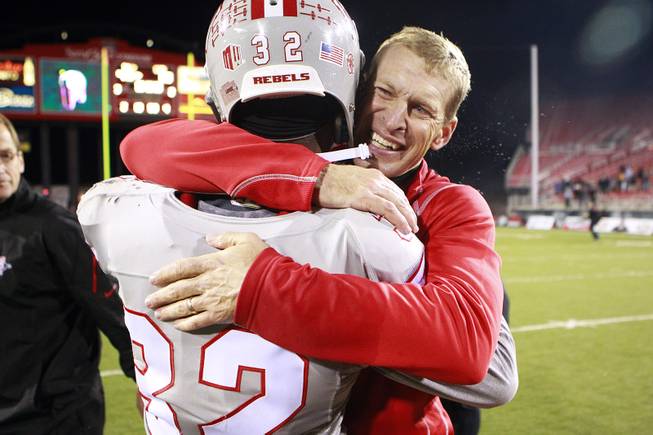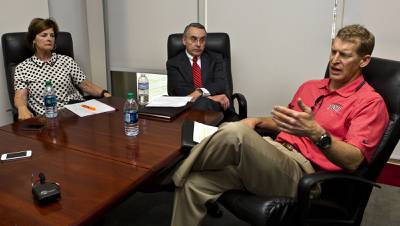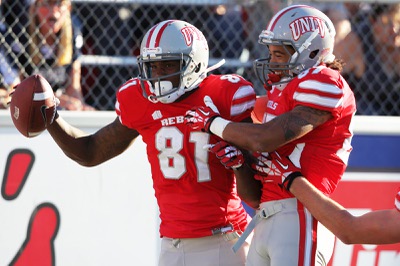
Sam Morris / Las Vegas Sun
UNLV head coach Bobby Hauck hugs defensive back Mike Horsey after defeating San Diego State 45-19 in their Mountain West Conference game Saturday, Nov. 30, 2013 at Sam Boyd Stadium.
Friday, June 27, 2014 | 2 a.m.
Related Content
A couple of months ago, UNLV Athletic Director Tina Kunzer-Murphy sat at one end of the conference table in her office explaining how UNLV would respond to becoming the first Division I football program that the NCAA banned from postseason play for its Academic Progress Rate score.
On Thursday, Kunzer-Murphy sat at the opposite end of the table. The view, and tone, was drastically different.
“Who would have ever thought?” she said. “The NCAA and UNLV working together.”
In an unprecedented move, the NCAA on Thursday lifted all punishments on UNLV football after the athletics department submitted additional information that changed the Rebels’ four-year APR score from 925 to 930. That’s the minimum score allowed with no punishments, so while this isn’t exactly a victory lap it’s a much better situation than the Rebels faced after what coach Bobby Hauck called a “personal failure” back in April.
“Bobby took a lot of heat from it and I’m really happy for him,” Kunzer-Murphy said.
Coming off their first bowl trip in 13 years, the Rebels will face no sanctions this season and will have a chance to make back-to-back postseason trips for the first time in program history.
When UNLV announced on April 10 that the NCAA had denied its appeal, part of the news was what the Rebels planned to do about preventing this in the future. Kunzer-Murphy, Hauck and UNLV President Don Snyder sat around that table and talked about investing approximately $250,000 into solving the issue, including creating a new APR oversight committee, creating two new hands-on academic services positions and bringing in the consulting firm Forward Progress, which specializes in APR issues.
“We felt we needed some expert opinions and they helped us,” Kunzer-Murphy said, “but our own people are the ones who went back and did the due diligence and never gave up.”
Led by David Wedley, UNLV’s assistant director for student-athlete academic services, the staff’s extra attention to detail and some different interpretations of the NCAA’s APR guidelines suddenly provided some hope. Kunzer-Murphy also gave credit to Snyder for offering help at every turn.
“To move forward, they had to look back at how we lost all these points,” Kunzer-Murphy said. “During the process, David was keeping us posted and saying we may be able to get back some points from those years.”
The APR is weighted to a 1,000-point scale with a maximum of four points available to each player during the school year. In 2011 the minimum was raised from 925. Idaho is now the lone Division I program banned from the postseason for an inadequate APR score.
Programs can lose points several ways, including a player becoming ineligible one semester, even if he later graduates, or a player transferring with a GPA lower than 2.6.
When UNLV’s academic advisors went to an NCAA conference last month they attended an APR seminar and learned “additional information,” Kunzer-Murphy said, about how to calculate certain situations. It was one of many steps that led to new ways to look at the Rebels’ old numbers.
“We always think it’s black and white with (the NCAA),” she said, “and that’s the criticism.”
UNLV found the gray. For example, Kunzer-Murphy said, the Rebels had multiple cases of players transferring in good standing with GPAs at about 2.5. They were able to gain points back by showing that those players were enrolled in legitimate, high-level courses.
That’s a concession that doesn’t fit the typical by the book persona of the NCAA, but it was a handful of similar situations and a delayed graduation that allowed UNLV to pick up a few points between 2009 and 2013 to get itself eligible.
Or at least they hoped that’s what would happen. The Rebels submitted their new paperwork with a nice cover letter last week.
“On Friday I knew our people did all their work, and they never gave up and I’m really proud of them,” Kunzer-Murphy said. “But we didn’t know what the NCAA would come back and say. I wasn’t optimistic.”
In maybe the biggest surprise of all, the typically slow-churning institution responded on Monday, saying that UNLV may have a point (or five) and then confirmed everything by Thursday. In less than a week, the Rebels sent out their information and got back their postseason chances.
Of course, a few things changed in the two months UNLV was ineligible. The Rebels scheduled a 13th game — Sept. 20 at Houston — that they had declined before the ban because the extra game means they need a 7-6 record to be bowl eligible rather than 6-6.
However, that game comes with a $400,000 payday for the athletics department and it will be an opportunity for a guy like senior receiver Devante Davis to play near his hometown.
The postseason ban meant that any senior could transfer without having to sit out, and although Davis said after the spring game he never considered doing that he probably had some options. Others jumped, namely running back Adonis Smith and offensive lineman Cameron Jefferson to Arizona and Arkansas, respectively.
Those guys never could have predicted this reversal, and it’s such a unique situation that it’s still not clear whether or not they could return. Even if they could, would they be welcomed back?
“If they change their mind, that will be up to Bobby,” Kunzer-Murphy said. “I can tell you this, though, the seniors who stayed are the ones I’m really excited about. … They want to be Rebels, and how great for them because some of them probably did have opportunities.”
UNLV kept working to find a possible solution while also trying to establish new standards for future performance and the NCAA, it seems, used a little common sense for once. Things certainly look different from the other side of the table.
Taylor Bern can be reached at 948-7844 or [email protected]. Follow Taylor on Twitter at twitter.com/taylorbern.



Join the Discussion:
Check this out for a full explanation of our conversion to the LiveFyre commenting system and instructions on how to sign up for an account.
Full comments policy